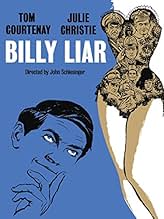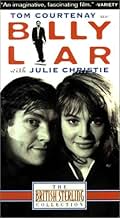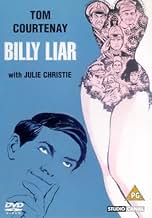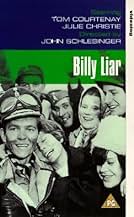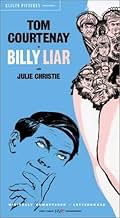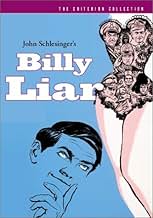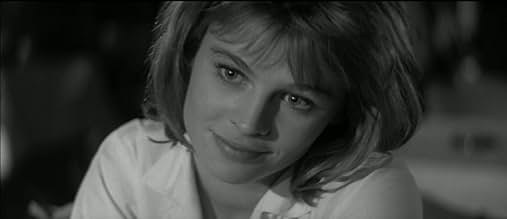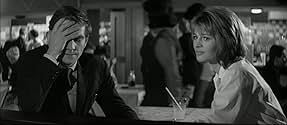IMDb RATING
7.2/10
7.5K
YOUR RATING
A lazy, irresponsible young clerk (Sir Tom Courtenay) in provincial Northern England lives in his own fantasy world and makes emotionally immature decisions as he alienates friends and famil... Read allA lazy, irresponsible young clerk (Sir Tom Courtenay) in provincial Northern England lives in his own fantasy world and makes emotionally immature decisions as he alienates friends and family.A lazy, irresponsible young clerk (Sir Tom Courtenay) in provincial Northern England lives in his own fantasy world and makes emotionally immature decisions as he alienates friends and family.
- Nominated for 6 BAFTA Awards
- 1 win & 7 nominations total
Jim Brady
- Prisoner Escort
- (uncredited)
Aleksander Browne
- Bit Part
- (uncredited)
James Byron
- Serviceman
- (uncredited)
Featured reviews
Billy Liar
John Schlesinger's excellent British comedy-drama concerns Billy (Tom Courtenay), a middle class young man who despises his position as a funeral parlor bookkeeper. Billy spends the majority of his time daydreaming of a much more interesting life filled with conquests, esp. of women. He'd love to quit his dead-end job and become a writer, but when the opportunity arrives, is he too content living in his head and telling lies to embellish his otherwise mundane existence? Too afraid to realize his dreams? This quirky slice-of-life is thematically similar to Le Distrait (The Daydreamer), a 1975 French release with an entirely different conclusion. A young, glowing Julie Christie appears briefly in Billy Liar, injecting color, life, and hope into Billy's dreary, black and white existence. Highly recommended. -- David Ross Smith
John Schlesinger's excellent British comedy-drama concerns Billy (Tom Courtenay), a middle class young man who despises his position as a funeral parlor bookkeeper. Billy spends the majority of his time daydreaming of a much more interesting life filled with conquests, esp. of women. He'd love to quit his dead-end job and become a writer, but when the opportunity arrives, is he too content living in his head and telling lies to embellish his otherwise mundane existence? Too afraid to realize his dreams? This quirky slice-of-life is thematically similar to Le Distrait (The Daydreamer), a 1975 French release with an entirely different conclusion. A young, glowing Julie Christie appears briefly in Billy Liar, injecting color, life, and hope into Billy's dreary, black and white existence. Highly recommended. -- David Ross Smith
Billy Liar (1963)
Billed as a "gay" movie by TCM when they played this in 2017, and the basis for that is fair enough—director John Schlesinger was openly gay, and the feeling of this film is very much about being an outsider to a larger culture. Which in the early 1960s is what most gay men (and women) experienced.
Heads up—this is a very British film, and it's on the cusp of a new Britain, getting out from World War II burdens and about to see the Beatles take over the world. In short, Mod England is in full swing, and the surprising new actress Julie Christie is key here. Maybe I'm just a guy, but I think the charm and honest presence of Christie from the first glimpse in a lorry (truck for you Americans) is a spark of life that tips the movie over. Great stuff.
The star however is the title character, played by Tom Courtenay, whose real character name is Billy Fisher. He's terrific, playing a cad of sorts, someone who lives by effect, a former soldier (in his head) who has settled uncomfortably into his beloved England.
The pace is crisp and the fast cuts are unusual for the time. There are oddities—early on he plays blackface in one scene (in his imagination), a woman in another (also daydreaming). It's farce top to bottom, and raw comedy. I think the British laughed harder by far than us poor Americans, but it's a lark and a fancy through and through. The flavor of it reminds me of "A Hard Days Night" and in fact they both come out of the so called British New Cinema.
The film is imaginative in its structure, depending on the wandering thoughts of Billy to change the scene at will. It's cheeky but clever, and keeps you looking. And chuckling. As a comedy it might not be uproarious, but it never lets up its absurdity. It's called Billy Liar because Billy succeeds with his co-workers and family by making things up. Endlessly.
Eventually you have to ask if the film can be read as an insight into being a gay man in these times. Certainly it can. It cheerfully points out how painful it is to be misunderstood and maligned for no good reason. It was easy to understand Billy as a a would-be success pushed down by his willing non-conformity. But it is also troubling to admit that this is something that is insinuated by TCM at the start—if you see the movie as a straight movie about an eccentric (not gay in particular) it has a different and less serious feel.
Maybe it's fair to let it be both, or let it float depending on the viewer. Because it remains fast, inventive, and funny throughout. Even the camera-work is fun, with lots of wide angle and with moving pans across landscapes that distort the world. Appropriately.
The final verdict: this is a film about the new England, the land of youth poking fun at the serious old school England of lore (and of WWII). It attacks this with necessary humor (not to offend absolutely everyone) and with visual pizazz. It wears slightly thin at times, and you do wonder what really matters about this aimless chap, but in all it's refreshing and revealing of the era.
And it has Julie Christie in her first film. As she says with revealing authority, "I don't want to get engaged, I want to get married." Yeah.
Billed as a "gay" movie by TCM when they played this in 2017, and the basis for that is fair enough—director John Schlesinger was openly gay, and the feeling of this film is very much about being an outsider to a larger culture. Which in the early 1960s is what most gay men (and women) experienced.
Heads up—this is a very British film, and it's on the cusp of a new Britain, getting out from World War II burdens and about to see the Beatles take over the world. In short, Mod England is in full swing, and the surprising new actress Julie Christie is key here. Maybe I'm just a guy, but I think the charm and honest presence of Christie from the first glimpse in a lorry (truck for you Americans) is a spark of life that tips the movie over. Great stuff.
The star however is the title character, played by Tom Courtenay, whose real character name is Billy Fisher. He's terrific, playing a cad of sorts, someone who lives by effect, a former soldier (in his head) who has settled uncomfortably into his beloved England.
The pace is crisp and the fast cuts are unusual for the time. There are oddities—early on he plays blackface in one scene (in his imagination), a woman in another (also daydreaming). It's farce top to bottom, and raw comedy. I think the British laughed harder by far than us poor Americans, but it's a lark and a fancy through and through. The flavor of it reminds me of "A Hard Days Night" and in fact they both come out of the so called British New Cinema.
The film is imaginative in its structure, depending on the wandering thoughts of Billy to change the scene at will. It's cheeky but clever, and keeps you looking. And chuckling. As a comedy it might not be uproarious, but it never lets up its absurdity. It's called Billy Liar because Billy succeeds with his co-workers and family by making things up. Endlessly.
Eventually you have to ask if the film can be read as an insight into being a gay man in these times. Certainly it can. It cheerfully points out how painful it is to be misunderstood and maligned for no good reason. It was easy to understand Billy as a a would-be success pushed down by his willing non-conformity. But it is also troubling to admit that this is something that is insinuated by TCM at the start—if you see the movie as a straight movie about an eccentric (not gay in particular) it has a different and less serious feel.
Maybe it's fair to let it be both, or let it float depending on the viewer. Because it remains fast, inventive, and funny throughout. Even the camera-work is fun, with lots of wide angle and with moving pans across landscapes that distort the world. Appropriately.
The final verdict: this is a film about the new England, the land of youth poking fun at the serious old school England of lore (and of WWII). It attacks this with necessary humor (not to offend absolutely everyone) and with visual pizazz. It wears slightly thin at times, and you do wonder what really matters about this aimless chap, but in all it's refreshing and revealing of the era.
And it has Julie Christie in her first film. As she says with revealing authority, "I don't want to get engaged, I want to get married." Yeah.
"Billy Liar!" impressed me more than many other admirable British pictures of this era, like "Room at the Top", "The Loneliness of the Long Distance Runner" and "This Sporting Life". It managed to generate a more tangible blend of poignancy and amusement. It's not often humour of the "laugh-out-loud" nature, more of the subtle, grim kind. The reality of Britain at that time is I suspect, very well conveyed here, with the old working-class, represented by Councillor Duxbury (astutely played by the fine Finlay Currie) and Billy's family, very much at odds with what they see as an ungrateful, decadent youth. All the performances hit the intended mark, with Leonard Rossiter typically Rossiter, almost as a younger Rigsby, without so much noticeable seediness. Julie Christie is as good as the role allows, an odd role, very much the "dream girl" of Billy and I dare say a good few others. The film expertly avoids sentimentalizing matters by its cunning, apposite last section. The Danny Boon character is, one suspects, all too typical of the TV light entertainer mould in reality. His reliance on cheap non-gags, smug guffaws and "audience banter" is well conveyed in just a few short scenes. It's interesting that Billy seems to aspire so much to write for him in particular... Helen Fraser's character Barbara is wonderfully quaint; a type long gone it seems. One can understand Billy's frustrations with his respectively prudish and plain (Barbara) and ignorant (Rita) girlfriends, and his anger at his family, although some sympathy is correctly reserved for them. The direction is very good by Schlesinger, emphasizing all the right things. The fine context-setting opening montage expertly draws in the viewer, and never at any stage henceforth is anyone's attention likely to wane. The film is most of all Tom Courtenay's; he gives a truly resonant performance, bringing to vivid life a character far removed from the norms of film making at the time. The fantasy sequences are finely done, and all add more deep impression of this character. His digressive tendencies, self-destructive habits, economy with the truth are well balanced by a sense of yearning and imagination. One cannot help but like and relate to the character, a creation that resoundingly rings true. His ambivalence to the class system comes across concisely, in particular. A fine film indeed, with so many of the smaller touches that many films miss. Witty, sad and a seminal film of the era, very much a crossroads in British history. Rating:- **** 1/2/*****
Effective slice of life comedy/drama tells the story of scared, optimistic Billy (Tom Courtenay) who lives in a fantasy world where he's always a hero. Funny and charming, the film also packs a slight emotional punch that is somewhat similar to The Last Picture Show. Based on a stage play, the story of Billy Liar has since been revamped as a musical yet it's this 1963 version that works best.
Tom Courtenay and Julie Christie (Liz) leapfrogged to stardom with their performances but every actor is beautifully cast: Mona Washbourne, Wilfred Pickles, and Ethel Griffies are the character types who give Billy's family heartbreaking nuances while Helen Fraser and Gwendolyn Watts bring a refreshingly sympathetic humanity to his polar opposite fiancees.
Liz's entrance, Billy's fantasies, a dance hall sequence, a quiet hospital exchange between Billy and his mother, and the final choice are classic scenes that have been constructed with genius by John Schlesinger (Darling, Midnight Cowboy, Sunday Bloody Sunday). The Criterion Collection's DVD treatment of Billy Liar is a standout and shouldn't be missed. It's a great film.
Tom Courtenay and Julie Christie (Liz) leapfrogged to stardom with their performances but every actor is beautifully cast: Mona Washbourne, Wilfred Pickles, and Ethel Griffies are the character types who give Billy's family heartbreaking nuances while Helen Fraser and Gwendolyn Watts bring a refreshingly sympathetic humanity to his polar opposite fiancees.
Liz's entrance, Billy's fantasies, a dance hall sequence, a quiet hospital exchange between Billy and his mother, and the final choice are classic scenes that have been constructed with genius by John Schlesinger (Darling, Midnight Cowboy, Sunday Bloody Sunday). The Criterion Collection's DVD treatment of Billy Liar is a standout and shouldn't be missed. It's a great film.
Tragi-comic misadventures of a young man who invents a fantasy world as cover for his troubles and dreary middle-class existence in sixties Yorkshire.
Billy Liar was always a terrific film, but like so many of its kitchen-sink contemporaries (Saturday Night and Sunday Morning, A Kind of Loving) it has actually grown in substance and depth since its release. Part of the reason is the extensive use of on-location filming all these movies utilised: a post-war industrial landscape long since lost and therefore all the more vivid in its posterity. But where Billy Liar gets a bigger march on its predecessors - whether by intent or accident - is that it captures this landscape on the cusp of the swinging sixties, when architecture, culture, leisure and morality were all rapidly changing. In doing so it heralds many of the themes and issues that were to dominate western culture for the remainder of the 20th Century: pop culture, advertising, media obsession, celebrity, race relations and fantasy lifestyles.
Billy seemed an endearing but essentially lost soul in his day; an immature weakling unable to face up to the realities and responsibilities of adulthood. But looked at from the hindsight of 40 years he now seems symptomatic of what is today regarded as normal, almost aspirational, behaviour: self-absorption; avoidance of responsibility; glorification of celebrity; escape culture.
Whether director John Schelsinger and writers Keith Waterhouse and Willis Hall foresaw all the cultural and sociological changes they captured is something only they would know (they surely couldn't have seen the significance of casting Julie Christie - one of the ultimate swinging sixties icons). Whatever the case, what makes Billy Liar such a fascinating film is the casual, uncritical and unselfconscious way its many themes are observed. Its lack of preachiness or self-righteousness help keep it a fresh and funny entertainment that can be enjoyed at that level. Its historical importance as a perfect snapshot of a country at a time of rapid and fundamental change is nothing less than priceless.
Billy Liar was always a terrific film, but like so many of its kitchen-sink contemporaries (Saturday Night and Sunday Morning, A Kind of Loving) it has actually grown in substance and depth since its release. Part of the reason is the extensive use of on-location filming all these movies utilised: a post-war industrial landscape long since lost and therefore all the more vivid in its posterity. But where Billy Liar gets a bigger march on its predecessors - whether by intent or accident - is that it captures this landscape on the cusp of the swinging sixties, when architecture, culture, leisure and morality were all rapidly changing. In doing so it heralds many of the themes and issues that were to dominate western culture for the remainder of the 20th Century: pop culture, advertising, media obsession, celebrity, race relations and fantasy lifestyles.
Billy seemed an endearing but essentially lost soul in his day; an immature weakling unable to face up to the realities and responsibilities of adulthood. But looked at from the hindsight of 40 years he now seems symptomatic of what is today regarded as normal, almost aspirational, behaviour: self-absorption; avoidance of responsibility; glorification of celebrity; escape culture.
Whether director John Schelsinger and writers Keith Waterhouse and Willis Hall foresaw all the cultural and sociological changes they captured is something only they would know (they surely couldn't have seen the significance of casting Julie Christie - one of the ultimate swinging sixties icons). Whatever the case, what makes Billy Liar such a fascinating film is the casual, uncritical and unselfconscious way its many themes are observed. Its lack of preachiness or self-righteousness help keep it a fresh and funny entertainment that can be enjoyed at that level. Its historical importance as a perfect snapshot of a country at a time of rapid and fundamental change is nothing less than priceless.
Did you know
- TriviaThis movie made a star of Julie Christie, even though she's only in it for a total of twelve minutes.
- GoofsIn the opening title sequence, where a woman places a blanket over a balcony and runs off, an arm can be seen popping up from behind the wall and throwing the blanket off the balcony.
- Quotes
Alice Fisher: If you're in any more trouble, Billy, it's not something you can leave behind you, you know. You put it in your suitcase, and you take it with you.
- ConnectionsFeatured in Film Review: Julie Christie & John Schlesinger (1967)
- SoundtracksTwisterella
Performed by Muriel Day (dubbed by unknown vocalist)
- How long is Billy Liar?Powered by Alexa
Details
- Release date
- Country of origin
- Language
- Also known as
- Lažov Bili
- Filming locations
- 37 Midland Road, Baildon, Shipley, Bradford, West Yorkshire, England, UK(Billy's house, Stradhoughton)
- Production companies
- See more company credits at IMDbPro
Box office
- Budget
- £236,809 (estimated)
- Gross worldwide
- $29,153
- Runtime
- 1h 38m(98 min)
- Color
- Aspect ratio
- 2.35 : 1
Contribute to this page
Suggest an edit or add missing content


